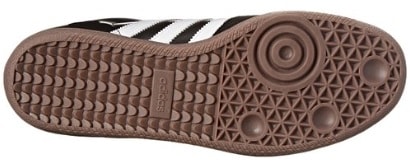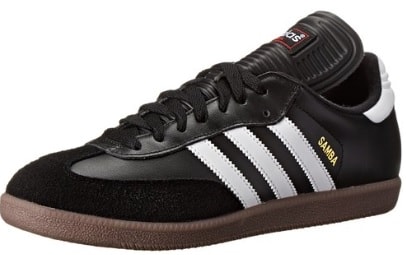What shoes should be worn for indoor soccer?
An indoor soccer shoe usually has a gum rubber flat
outsole. They are created for playing indoor soccer or futsal in a gym
or rec facility, but will also work for leisure and street wear. Indoor
soccer shoes have a lower profile fit and look like a lightweight
sneaker.
Another form of indoor soccer is futsal.
Shoes are designed for the fast, five-a-side play, futsal shoes
are usually extremely lightweight. Futsal shoes have low profile rubber
outsoles for traction on flat indoor courts and turf surfaces.
Indoor soccer or arena soccer is a
game derived from association football adapted for play in a walled
indoor arena. Indoor soccer, as it is most often known in the United
States and Canada, was originally developed in these two countries as a
way to play football during the winter months, when snow would make
outdoor play difficult. In those countries, areas such as hockey rinks
or basketball courts are adapted for indoor soccer play. In other
countries the game is played in either indoor or outdoor arenas
surrounded by walls, and is referred to by different names (such as fast
football (futbol rapido) in Mexico, showbol in South America, and indoor
football (futbol indoor) in Spain). Indoor soccer has different
regulations from other versions of association football designed for
indoor play, such as futsal and five-a-side football. Unlike futsal,
which is played on ceramic surfaces, indoor soccer is played on
synthetic turf. Indoor soccer courts are delimited by walls instead of
lines, and there are no player throw-ins.
Indoor soccer is most popular in the United States,
Canada, and Mexico, with several amateur, collegiate and professional
leagues functioning. While internationally less popular than futsal,
indoor soccer is also played at the league level in many countries
outside North America. The World Minifootball Federation (WMF) is the
governing body of indoor soccer at the international level, having
replaced the International Fast Football Federation (FIFRA).
FIFA, the international body that oversees
international association football competitions, does not sanction the
synthetic turf version of indoor soccer, having developed its own code
of indoor football (which they refer to as futsal).
Futsal is a variant of association football
played on a smaller field and mainly indoors. It can be considered a
version of five-a-side football. Futsal is played between two
teams of five players each, one of whom is the goalkeeper. Unlimited
substitutions are permitted. Unlike some other forms of indoor football,
the game is played on a hard court surface delimited by lines; walls or
boards are not used. Futsal is also played with a smaller ball with less
bounce than a regular football due to the surface of the field. The
surface, ball and rules create an emphasis on improvisation, creativity
and technique as well as ball control and passing in small spaces.
adidas Performance Men's Samba Classic Indoor Soccer Shoe (year 2016): Originally made for frozen pitches, the men’s Samba shoes dig into the archives for inspiration. They feature a sleek suede upper with contrasting suede overlays, contrasting 3-Stripes and a pivot-point rubber outsole for grip. There's a reason this legendary indoor shoe still sells like mad. Perfection never goes out of style. Its soft leather upper and low-profile gum rubber outsole give the elite player ultimate control.
- Leather
- Rubber sole
- Full grain leather upper
- Die-cut EVA insole for lightweight comfort
- Non-marking gum rubber outsole for excellent grip on all indoor surfaces
Top-end indoor soccer shoes also feature the same design innovations found in soccer cleats. These can give you more control and an increased overall feel for the ball. Manufacturers also design the flat-surfaced outsoles specifically for indoor soccer surfaces, providing greater grip and traction than regular sneakers would allow.
You may also want to learn about cleats & turf shoes.
Learn about indoor sports from the US Indoor Sports Association.
What is the difference between indoor soccer shoes and turf shoes?
Thank you for using the Apparel Search website.

